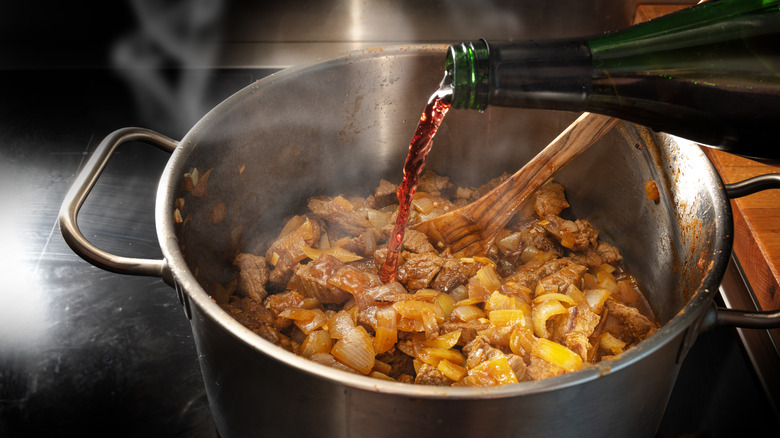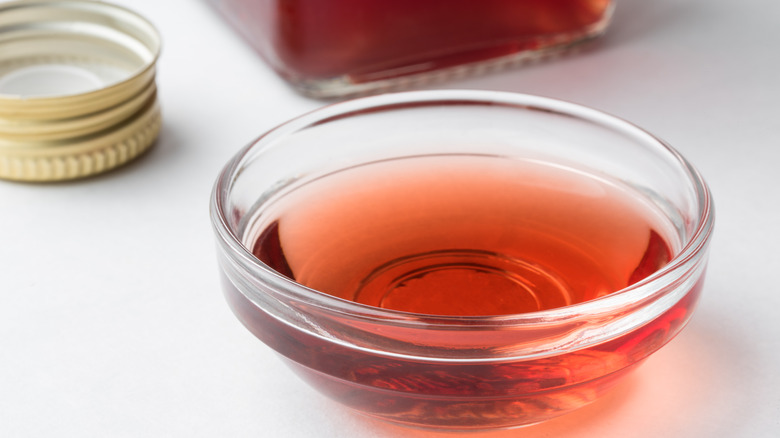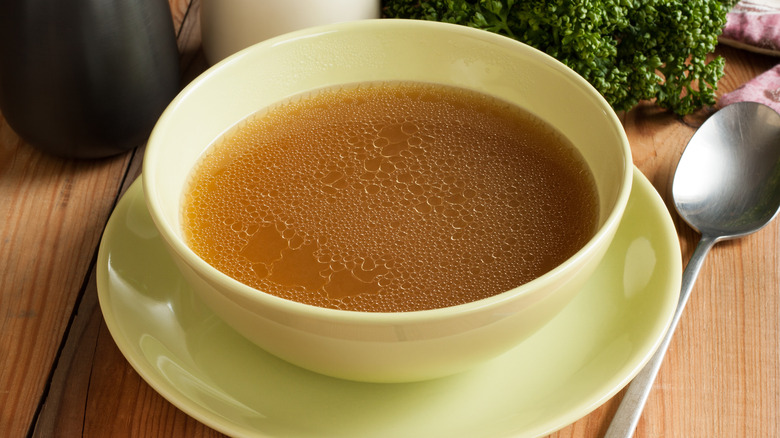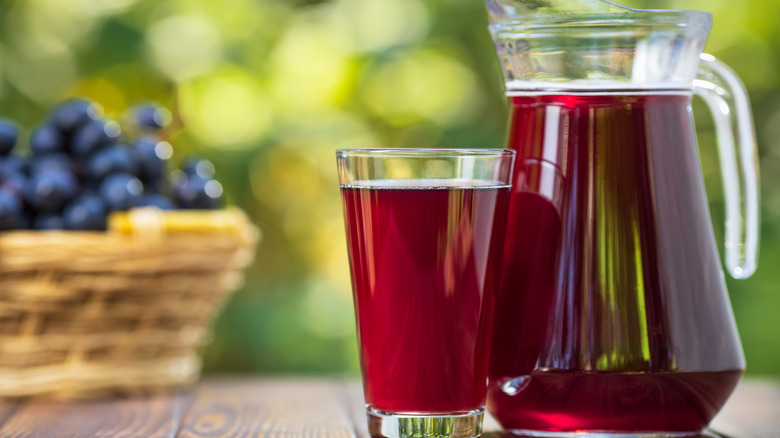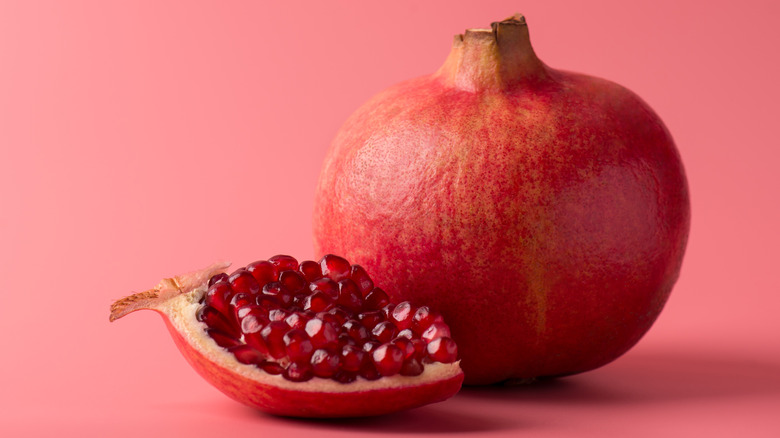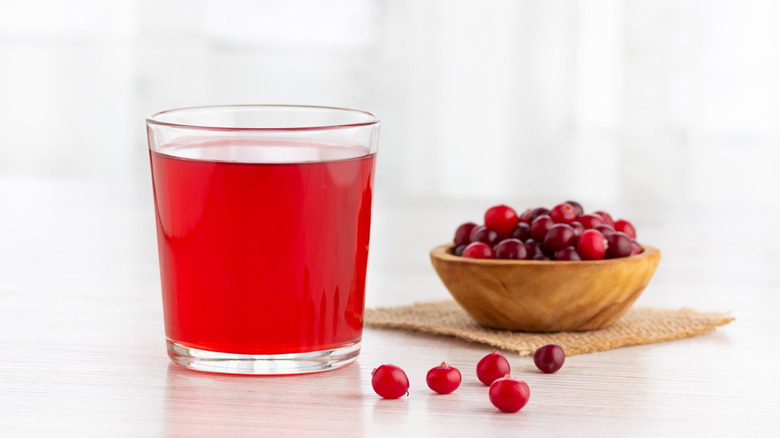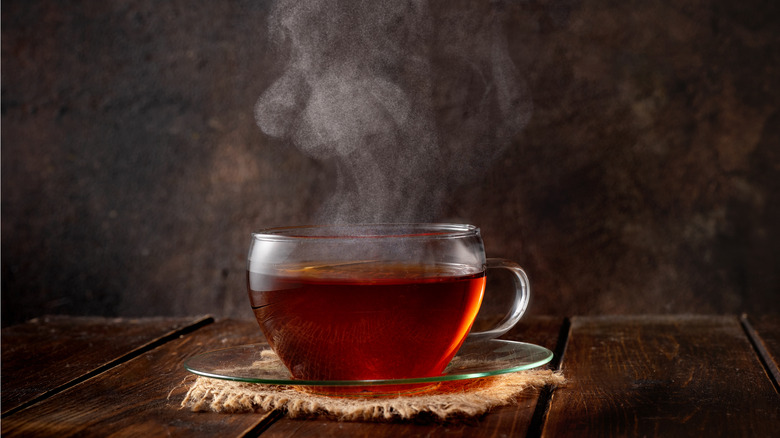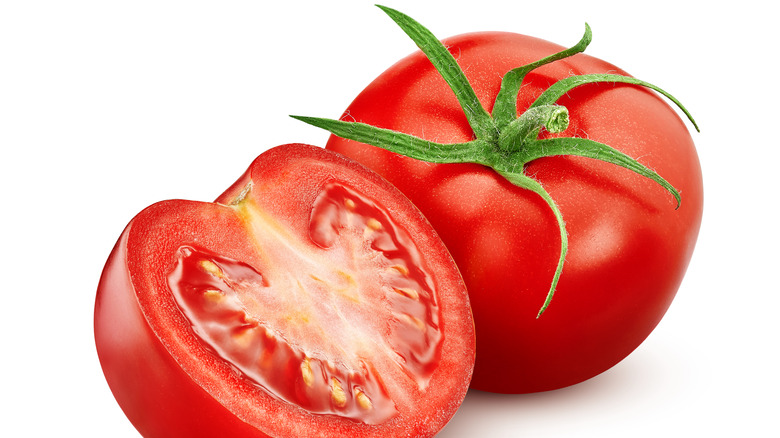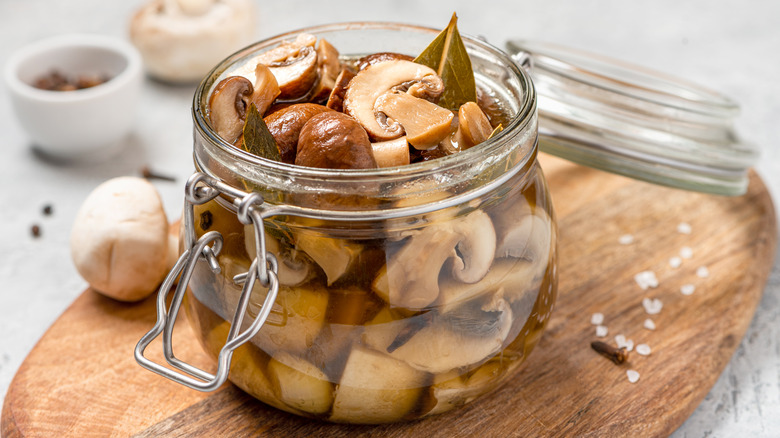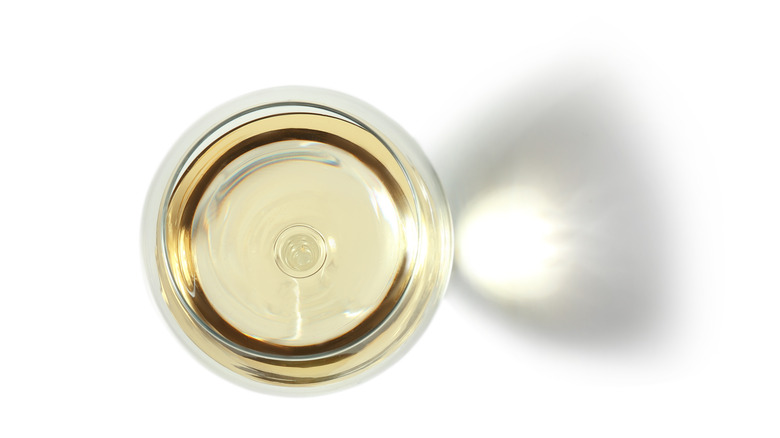10 Best Substitutes For Red Wine
Adding a splash of good red wine is the secret to many wonderful recipes — and for good reason. Along with adding heaps of flavor and depth to food, red wine adds acidity and natural sweetness to it, too. Red wine can also be used to deglaze pans which will add even more flavor to the food and can be used to make meats tender and add moisture to them.
According to Allrecipes, instead of adding a flavor of its own, red wine helps bring out the flavors of other ingredients. It does so by dissolving fats and that amplifies the flavor in a way that no other liquids can. However, red wines have tannins — more tannins than any other wines — and that makes it a tricky ingredient to substitute.
In case you don't have a bottle of red wine handy or just want to keep your dish non-alcoholic, as long as you know what the red wine is meant to do in your recipe, it can easily be substituted.
1. Red Wine Vinegar
Since red wine vinegar is made from red wine, it is the closest substitute for red wine in terms of both its flavor and its composition. According to Healthline, red wine vinegar contains water and acetic acid, which boosts the flavor of food in a way similar to how red wine does, without completely changing the flavor of your dish.
The site suggests using red wine vinegar as a substitute for red wine in marinades, salad dressings, and other liquid recipes. You can also use it in recipes that need red wine to add flavor to meat and vegetables. Red wine vinegar is acidic and so it can be used as a substitute for red wine when deglazing a pan, too (via Kitchn). Though, Healthline warns that red wine vinegar is one of the few red wine substitutes that is actually more acidic than red wine itself and recommends diluting the vinegar before adding it to recipes. Red wine vinegar may also contain alcohol so it's best to use another substitute if you want a non-alcoholic swap for red wine.
To dilute red wine vinegar, mix an equal amount of water in it with a 1:1 ratio.
2. Beef Stock
If you're following a recipe that calls for red wine in order to add flavor to your dish, beef stock is the next best thing. Beef stock is generally made by simmering animal bones with herbs and spices (via Healthline). Meat is then simmered in the stock to make it tender. This is why beef stock works best as a substitute for red wine when you want the red wine substitute to tenderize the meat and add flavor to it. Beef broth is also the closest substitute for red wine if you want a deep color in your dish, similar to the color red wine would add.
While you could use chicken stock or a vegetable one for vegetarian or vegan recipes, The Spruce Eats suggests sticking with beef stock if you can as it's less acidic than red wine. The site also recommends adding a splash of white vinegar along with the beef stock when using it as a red wine substitute to tenderize meat.
To use beef broth in place of red wine, replace equal amounts of red wine with beef stock. For best results, you should also add a dash of white vinegar to it — 1 tablespoon of white vinegar for every cup of beef broth.
3. Red Grape Juice
Red wine itself is made from red grapes so it's really no surprise that red grape juice works as a substitute for red wine. Using red grape juice will add a similar taste, color, and consistency as that of red wine except, it won't have the alcohol, according to Foodi Ideas.
However, since red grape juice isn't fermented the way red wine is, it lacks the tart flavor and acidity as that of red wine and is comparatively much sweeter. For this reason, The Spruce Eats suggests adding a tiny amount of vinegar to red grape juice. Doing so will make the red grape juice less sweet and will add more flavor to your final dish. Adding vinegar to the red grape juice will also make the red grape juice a better meat tenderizing substitute for red wine.
Red grape juice can be used to substitute red wine with a 1:1 ratio. For best results, add a small amount of vinegar to the red grape juice as well.
4. Pomegranate Juice
Similar to red grape juice, pomegranate juice, too, has a sweet and fruity flavor of its own without the tartness of red wine. However, unlike red grape juice which lacks acidity, pomegranate juice is almost as acidic as red wine and has a similar color, flavor, and aroma (via Healthline). Pomegranate juice is also associated with various health benefits because it is a great source of antioxidants and can lower blood pressure.
Healthline says that you can use pomegranate juice as a substitute for red wine if you're making a dressing for salads or using it to add color and flavor to the sauce and as a glaze for your vegetables.
To use pomegranate juice as a substitute for red wine, simply replace the red wine with equal amounts of the juice. If you want to give your dish a boost of flavor, you can add 1 tablespoon of vinegar to your pomegranate juice to make it as acidic as red wine.
5. Cranberry Juice
Since cranberries are naturally sour and tart in flavor, cranberry juice makes for an excellent substitute for red wine. It will add a similar color to your dish as that of red wine, add more acidity, and will do the job of giving your dish a similar depth of flavor as a red wine would (via Healthline). Besides, cranberry juice is rich in antioxidants so the juice will provide an added health benefit to your recipe.
When using cranberry juice as a substitute for red wine, be sure to use an unsweetened carton of the juice. The cranberry juice that you'd usually use to make a cosmopolitan comes with a lot of sugar itself. While you could go ahead and use the sweetened kind of cranberry juice in desserts, it might not do the trick in savory dishes (via Foodi Ideas). When using sweetened cranberry juice in place of red wine in desserts, make sure to cut back on other sources of sugar to avoid an overly sweet dessert.
You can use a 1:1 ratio to substitute red wine with cranberry juice.
6. Black Tea
Jack Monroe, the founder of Cooking on a Bootstrap, said in a tweet that a medium-strong batch of black tea with a tiny amount of any vinegar and tomato puree works as a substitute for red wine. She explains that this concoction works because it has tannins similar to red wine, provides the color and richness that red wine adds to foods whilst also leaving behind a tangy aftertaste.
Cook's Illustrated put Monroe's substitution to test by making two batches of pot roast — one braised in an entire bottle of Cabernet Sauvignon and another braised in equal amounts of black tea and a dash of vinegar. They found the pot roast and gravy made with black tea and vinegar to be quite similar to the one made with red wine and found that the tea helped to balance the richness of the beef. Since the pot roast itself has strong and complex flavors, they mask the taste of black tea and vinegar quite well. However, the black tea and vinegar substitute didn't work so well when they tried it in a red wine sauce.
To use black tea as a substitute for red wine, steep one bag of black tea in 4 ounces of boiling water and add 1 tablespoon of distilled white wine vinegar to it. You can then use an equal amount of this mixture to replace red wine in your recipe.
7. Water
Water is a curveball when it comes to substitutes for red wine but it's also the easiest, handy, and the most no-frill substitute that can be suitable for all diets. Healthline says that water won't add a deep color to your food or add any flavor and acidity to it as red wine would but, it most certainly will act as a liquid ingredient in your recipe and prevent the food from drying out while cooking.
Red wine usually works to give foods more complexity and so, when replacing it with water, be sure to season your dish well while cooking to prevent water from diluting the flavor (via MasterClass). Healthline further recommends adding vinegar and sugar to the water to help bring out more flavor in your food.
For best results, add 1/4 cup of vinegar and 1 tablespoon of sugar to 1/4 cup of water. You can use this mixture as a 1:1 substitute for red wine.
8. Tomato Juice
Tomato juice is far from being a close substitute for red wine in terms of taste however, its acidity and color are similar to that of red wine and can work well as a flavor-enhancing replacement for red wine, especially in marinades. It helps that tomato juice has considerable health benefits. About 237 milliliters of tomato juice makes for 74% of your recommended daily vitamin C intake and 22% of your daily vitamin A intake (via Healthline). And that's not all. One cup of tomato juice has over 20 different kinds of nutrients.
However, when using it as a substitute for red wine, Healthline warns that tomato juice will add a bitter flavor if used on its own. They recommend mixing it with a fruit juice of your choice to sweeten it and tasting your dish as you're cooking it to find a balance that works.
For best results, mix half a cup of tomato juice with half a cup of pomegranate, red grape, or cranberry juice to substitute one cup of red wine (via Foodi Ideas).
9. Liquid from Canned Mushrooms
At first look, mushrooms and red wine have absolutely nothing in common. They look and taste nothing like each other, but surprisingly, the liquid that canned mushrooms come floating in, is a great substitute for red wine. It has to do with the flavor that the liquid absorbs from the mushrooms, which makes it acidic and similar to red wine (via Foodi Ideas).
Since the liquid has a savory taste from the mushrooms, Healthline says that the liquid from canned mushrooms can be substituted for red wine in savory dishes. If you want to use the liquid in desserts, the site recommends mixing in either cranberry, pomegranate, or red grape juice with it. They also caution that the liquid in canned mushrooms can be quite high in sodium, so be sure to pick a can of mushroom that is low in sodium if you want to avoid that.
Mix half a cup of the liquid from canned mushrooms with half a cup of cranberry, pomegranate, or red grape juice to replace one cup of red wine.
10. Dry White Wine
If you can't use red wine simply because you don't have one but want an alcoholic substitute for it, you can use a dry white wine instead. Kitchn says that all wines, both red and white, react with food in the same way, so substituting red wine with white wine will definitely work.
The best white wine to use in place of red wine is a dry white wine (via A Couple Cooks). The flavor of dry white wine is quite similar to that of red wine and you'll also get all the perks of using a wine — its acidity, the complexity and depth that it adds to food, and most importantly, the booze. However, using white wine in place of red means that you won't get the deep and dark color it adds to food.
For best results, use an equal amount of dry white wine to replace red wine in your recipe.
